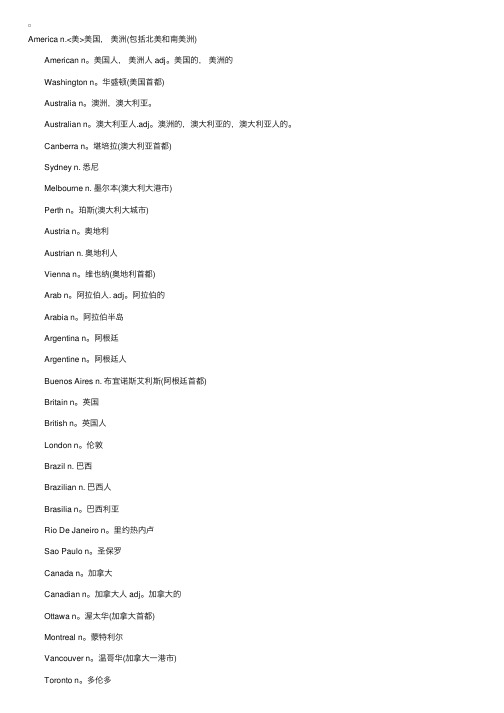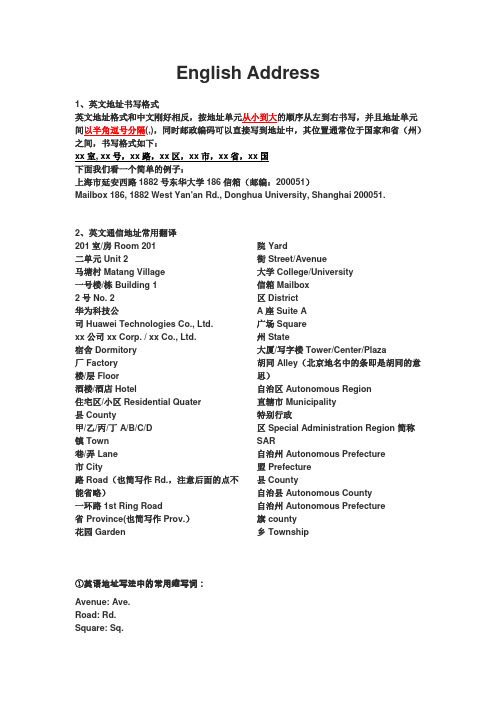American English Address
看美剧必备:人人都爱说的 dude 是什么意思?

Apr.05·2020A brief history of dudeDude may be the most Mandarin Chinese word in American English.In Mandarin,depending on how I intone the single syllable ma,I could be saying “mother”(mā),or I could be saying something as radically distinct as“horse”(mă).Dude has a comparable quality.Just think of the last time you did something awesome in the presence of a friend who affirmed your awesomeness with the exclamation Duuude!Or the last time you said something objectionable to someone who began setting you straight with a firm and sober Dude.The difference in connotation is pretty major.So what does the word itself mean?Dictionaries struggle with this question. Here,for instance,is Merriam-Webster:1.a man extremely fastidious in dress and manner2.a city dweller unfamiliar with life on the range3.fellow,guy—sometimes used informally as a term of addressBut according to Scott F.Kiesling,the author of a seminal2004study—titled, yes,“Dude”—the term has long implied a particular understanding of fellowship among guys.Its dominant linguistic function,Kiesling argues,has been to enable men,mainly young men,to address one another in a laid-back camaraderie.And women now use the word,too—both with men and with other women. Perhaps unsurprisingly,usage patterns vary by gender:Kiesling’s work indicates, for instance,that women show a relative tendency to deploy the term when trying to mitigate conflict with friends or acquaintances.(“Dude,you know I’d never dothat.”)But even this usage is a variation on a theme.It always implies the same thing:reinforcing a specific kind of social relationship without intimacy.2020年4月05日看美剧必备:人人都爱说的dude是什么意思?讲解人·雪梨流利说®阅读内容负责人哈佛大学语言教育硕士雪梨读诗栏目创始人今日导读英语中的词汇会反映社会文化的变迁,简单的一个单词可能在各个时代的意义用法都不尽相同。
考研英语翻译必备:国家名和城市名

America n.<美>美国,美洲(包括北美和南美洲) American n。
美国⼈,美洲⼈ adj。
美国的,美洲的 Washington n。
华盛顿(美国⾸都) Australia n。
澳洲,澳⼤利亚。
Australian n。
澳⼤利亚⼈.adj。
澳洲的,澳⼤利亚的,澳⼤利亚⼈的。
Canberra n。
堪培拉(澳⼤利亚⾸都) Sydney n. 悉尼 Melbourne n. 墨尔本(澳⼤利⼤港市) Perth n。
珀斯(澳⼤利⼤城市) Austria n。
奥地利 Austrian n. 奥地利⼈ Vienna n。
维也纳(奥地利⾸都) Arab n。
阿拉伯⼈. adj。
阿拉伯的 Arabia n。
阿拉伯半岛 Argentina n。
阿根廷 Argentine n。
阿根廷⼈ Buenos Aires n. 布宜诺斯艾利斯(阿根廷⾸都) Britain n。
英国 British n。
英国⼈ London n。
伦敦 Brazil n. 巴西 Brazilian n. 巴西⼈ Brasilia n。
巴西利亚 Rio De Janeiro n。
⾥约热内卢 Sao Paulo n。
圣保罗 Canada n。
加拿⼤ Canadian n。
加拿⼤⼈ adj。
加拿⼤的 Ottawa n。
渥太华(加拿⼤⾸都) Montreal n。
蒙特利尔 Vancouver n。
温哥华(加拿⼤⼀港市) Toronto n。
多伦多 Chile n. 智利 Santiago n。
圣地亚哥(智利⾸都) Denmark n. 丹麦 Danish n。
丹麦语 Copenhagen n。
哥本哈根 England n。
英格兰(英国的主要部分)(泛指)英格兰和威尔⼠(泛指)英国 English n。
英国⼈,英语 adj。
英⽂的,英国⼈的,英格兰的 Egypt n. 埃及 Egyptian n。
埃及⼈ Cairo n。
开罗(埃及⾸都) Finland n. 芬兰 Finnish n。
美国的地址及邮编

小弟在此提供几个美国的地址、邮编、电话供你注册US 的Offers 时参考。
美国的地址及邮编(德克萨斯州)Texas 休斯敦(Houston)Name MetroBank Bellaire Joke TomPhone 713-776-3876 713-776-3648Address 9600 Bellaire Blve. Suite 101 6128 wilcrest DrCity houston houstonZip 77036 77072街、Branson Rd. Country Dr. Lindley A ve. Pinelake Dr.城市Kansas Dover Juneau Raleigh省(州)MO DE AK NC,邮编64104 19901 99850 27601电话816-422-XXXX 302-519-XXXX 907-294-XXXX 919-390-XXXX第二点:US的问题解决了很多offer是需要信用卡的:V alid credit card is required.或NETeller ot credit card required. 或Credit card required都是要信用卡,我没卡怎么怎么办?一般这类offer都是点数比较高的,比较难注册,我们可以找点数低的一些offer注册,这里列几个比较容易注册的offer,而且都是完全免费(free for all,大家注册的时候也可以注意找标写着free for all,no card required),不需要卡的哦no card required,大家只要仔细填就是了,多有点耐心,一次填不对再改一下,这几个offer本人基本都注册过,没什么大问题,就是点数少点,不过凑够6个就可以了,如果你能注册成功那些好几万点的offer的话不妨也向大家介绍一下经验哦第三点:一般你注册了offer之后,这些站点都给你发一封确认信到你的邮箱,包含密码,站点登陆确认等,大家最好都收一下这些信,信一般都是这些标题???? confirm或者welcom to ourweb等字样的,有些网站是必须点信里的连接才认为你注册的,所以大家一定注意!!第四点:注册的offers一般要4-6个星期才能到账。
美式英语信件格式范文

美式英语信件格式范文英文回答:Formal Letter Format in American English.A formal letter in American English typically follows a standardized format that includes the following elements:1. Letterhead: If writing on official company letterhead, include the company's name, address, phone number, and website.2. Date: Place the date below the letterhead on theright side of the page. Use the American date format (month, day, year).3. Inside Address: The inside address is therecipient's address. It includes the recipient's name,title (if any), company name (if applicable), street address, city, state, and zip code. If the recipient'saddress is unknown, use "Dear [Recipient's Title]."4. Salutation: The salutation is a formal greeting that begins the letter. Common salutations include "Dear Mr./Ms. [Last Name]," "Dear Dr. [Last Name]," or "To Whom It May Concern." Use a colon after the salutation.5. Body: The body of the letter is where you state your purpose for writing. Be clear, concise, and professional. Use paragraphs to organize your thoughts.6. Closing: The closing is a formal phrase that endsthe letter. Common closings include "Sincerely," "Respectfully," or "Best regards." Use a comma after the closing.7. Signature: Sign your name in blue or black ink. If you are using a typed letter, you can include a scanned signature or a digital signature.8. Typed Name: Type your full name below your signature.9. Enclosures: If you are including any enclosures, indicate so at the bottom of the page. For example, "Enclosed: Resume."10. Postscript (P.S.): A postscript is used to add additional information after the letter has been signed.Example Formal Letter:[Your Address][Your City, State, Zip Code][Date][Recipient's Name][Recipient's Title][Recipient's Company][Recipient's Address]Dear Mr./Ms. [Last Name],。
外研版六年级上册module5~module10短语知识点总结

Module5 Unit11.there’s=there is 有...There is +可数名词单数/不可数名词There is a book. 有一本书。
There is some juice. 有一些果汁。
2.Can he speak English?(做否定回答。
)No,he can’t.3.You can speak English.(改为否定句)You can’t speak English.4.his teacher 他的老师5.speak(单三)speaks 说讲6.my cousin 我的堂兄7.be (am is are) from... 来自8.He is from China. 他来自中国。
9.I am from the UK. 我来自英国。
10.Pleased to meet you! 很高兴见到你!11.speak some English 说一些英语12.speak very good English 英语说的很好13.I’ve got=I have got 我有14.from the UK 来自英国from the US 来自美国15.two friends 两位朋友16.their 他们的17.their address 他们的地址18.write to your friends 给你的朋友们写信19.of course 当然20.want a pen friend 想要一个笔友21.be my Chinese pen friend 成为我中国的笔友22.my address 我的地址23.write in Chinese 用汉语写write in English 用英语写Module5 Unit21.want a pen friend 想要一个笔友2.write in English and Chinese用英语和汉语写write in French 用法语写3.a phone friend 一位“话”友4.Please be my pen friend!请成为我的笔友!5.like football 喜欢足球6.like +动词ing7.like reading 喜欢阅读8.like swimming 喜欢游泳9.like singing songs 喜欢唱歌10.like drawing 喜欢画画11.like playing games 喜欢玩游戏12.like riding my bicycle喜欢骑我的自行车13.like collecting stamps 喜欢集邮14.story(复数)stories 故事15.paint(动名词)painting 绘画16.my pet dog 我的宠物狗Module6 Unit11.Have you got...? 你有...吗?Yes,I have./No,I haven’t.是的,我有。
大学英语综合教程第三册课件unit2

Language Study 1
• Words and Expressions
Historic: famous or important history
• In his book, Churchill recalls that historic first meeting with Roosevelt. • More money is needed for the preservation of historic buildings and monuments. • ancient historic sites/ historic monuments 译: • 杨立伟的太空旅行具有重要历史意义。 杨立伟的太空旅行具有重要历史意义。
Language Study 1
• Words and Expressions
Stand up for (for sb./sth.) : speak, work, etc. in
favour of sb./sth.; support sb./sth. • You have to be prepared to stand up for the things you believe in. • Don’t be afraid to stand up for yourself. 译: • 在朋友遇到为难的时候,你应该为他挺身而出。 在朋友遇到为难的时候,
Language Study 1
• Words and Expressions
Intent:
1) to be determined to do something or achieve something be intent on/upon (doing) something • She was intent on pursuing a career in business 2) giving careful attention • his intent gaze • Intent upon her work, she didn't notice the cold. 译: • 你是不是存心要破坏我的声誉? 你是不是存心要破坏我的声誉? • 他目不转睛地看着她。 他目不转睛地看着她。
如何称呼外婆姐妹英文作文

如何称呼外婆姐妹英文作文英文,How to Address Grandmother's Sisters in English Writing。
When it comes to addressing my grandmother's sisters in English writing, there are a few options depending on the family's preference and cultural background. Here are some common ways to address them:1. Great Aunt: This is a formal title that can be used for any of my grandmother's sisters. It's a respectful way to address them and is commonly used in British English.2. Auntie: This is a more informal and affectionate way to address my grandmother's sisters. It's commonly used in American English and can be a way to show closeness and familiarity.3. First name: Depending on the family's culture and preferences, it may be appropriate to address mygrandmother's sisters by their first names. This is a more casual and familiar way to address them.中文,如何称呼外婆姐妹的英文写作。
英文地址书写格式

English Address1、英文地址书写格式英文地址格式和中文刚好相反,按地址单元从小到大的顺序从左到右书写,并且地址单元间以半角逗号分隔(,),同时邮政编码可以直接写到地址中,其位置通常位于国家和省(州)之间,书写格式如下:xx室, xx号,xx路,xx区,xx市,xx省,xx国下面我们看一个简单的例子:上海市延安西路1882号东华大学186信箱(邮编:200051)Mailbox 186, 1882 West Yan'an Rd., Donghua University, Shanghai 200051.2、英文通信地址常用翻译201室/房 Room 201二单元 Unit 2马塘村 Matang Village一号楼/栋 Building 12号 No. 2华为科技公司 Huawei Technologies Co., Ltd.xx公司 xx Corp. / xx Co., Ltd.宿舍 Dormitory厂 Factory楼/层 Floor酒楼/酒店 Hotel住宅区/小区 Residential Quater县 County甲/乙/丙/丁 A/B/C/D镇 Town巷/弄 Lane市 City路 Road(也简写作Rd.,注意后面的点不能省略)一环路 1st Ring Road省 Province(也简写作Prov.)花园 Garden 院 Yard街 Street/Avenue大学 College/University信箱 Mailbox区 DistrictA座 Suite A广场 Square州 State大厦/写字楼 Tower/Center/Plaza胡同 Alley(北京地名中的条即是胡同的意思)自治区 Autonomous Region直辖市 Municipality特别行政区 Special Administration Region 简称SAR自治州 Autonomous Prefecture盟 Prefecture县 County自治县 Autonomous County自治州 Autonomous Prefecture旗 county乡 Township①英语地址写法中的常用缩写词:Avenue: Ave.Road: Rd.Square: Sq.Province: Prov.Street: St.District: Dist.Floor: /FRoom: Rm.Apartment: Apt.Building: Bldg.Mountain: Mt.②简写中的点不能省略,如Rd., Prov.③xx东路/南路/西路/北路中的东南西北可分别缩写E/S/W/N,且一定要放在路名前,如(延安西路)West Yan'an Rd.而不是Yan'an West Rd.④Room 1203, Building 2 (2号楼1203室)可以简写成2-1203。
- 1、下载文档前请自行甄别文档内容的完整性,平台不提供额外的编辑、内容补充、找答案等附加服务。
- 2、"仅部分预览"的文档,不可在线预览部分如存在完整性等问题,可反馈申请退款(可完整预览的文档不适用该条件!)。
- 3、如文档侵犯您的权益,请联系客服反馈,我们会尽快为您处理(人工客服工作时间:9:00-18:30)。
美国英语称谓研究
是否使用“同等”和“权势”的代名词形式是一个人称呼另一个人的选择。
这个称呼的选择对讲英语的人操纵有利,也和那些有“同等”和“权势”的语言一样。
对美国英语称谓系统的研究,著名的是布朗和福特(1961/1964)和欧文·特里普(1972)。
这些研究已经成为一个经典。
此外,史洛宾等(1968)对布朗和福特的研究做了进一步的发展。
虽然稍后我们会提到其他选择,但是美国英语中的主要选择是第一名字和头衔加姓氏。
第一名字是类属于“同等”,而头衔加姓氏是属于“权势”。
布朗和福特在他们的调查中使用各种各样的数据来影响这个选择。
像布朗和吉尔曼,他们使用文学资料(一组美国现代剧)进行研究。
他们也记录了一个公司的超过200名职员之间使用的称谓语,此方法称为人类学家的“参与-观察”法。
此外,他们还记录了对美国西部的56名孩子进行一项心理研究项目的观察。
这个心理项目是关于另一个话题的,他们经常使用称呼语。
他们还对34位业务高管做了问卷调查。
关于这两种形式的三种模式是彼此直呼其名(包括常见的昵称,如“鲍勃”和“吉姆”)、彼此采用头衔加姓名(先生,夫人,博士等等的头衔)和非对称性选择方式(一个人告诉姓名,然后头衔加姓名称呼)。
根据布朗和福特,两个对等模式是由从相识到亲密的单一维度控制。
美国人称呼熟悉的人时用头衔加姓氏,同样他们也希望别人这样称呼他们。
朋友之间的称呼就会使用第一名字。
布朗和福特认为这两种关系之间有微妙的不同,五分钟的谈话就会让美国人的头衔加姓氏的称呼直接变为姓名的称呼。
从我个人的经验来说,如果一个人开始时就一直用比较“权势”的称呼的话,就算过了五分钟称呼也不会改变。
例如:当新职员第一次见同事或一个人刚搬到附近的人遇到邻居时,互换姓名是常见的交际。
这是美国人的特点,而不是其他语言的特点,更不是其他说英语的人的特点。
实际上,这样的观念,像“同等”、“权势”和“亲密是一个国家到另一个国家,甚至一个国家的一个社会团体向另一个团体,是使用称谓形式变化的一个主要来源。
American English Address
Related to the use of T and V pronoun forms is the choice of the name which one person will use to address someone else. The choice is available for manipulation by speakers of English as well as in languages that have T and V. The address system of American English, in particular, has been analyzed by Brown and Ford (1961/1964) and by Ervin-Tripp (1972). Each of these studies has become something of a classic. In addition, Slobin et al. (1968) have down a small follow-up study of the Brown and Ford research.
Although there are other options which we will mention later, the principal choices in American English are between first name (FN) and title with last name (TLN), with FN roughly analogous to T and TLN to V. Brown and Ford used a variety of data in their investigation of which forces influence this choice. Like Brown and Gilman, they used literary sources (a set of modern American plays). They also records of more than 200 interactions came from an employee of the firm who made belief notes of his collogues‟ address behavior (the anthropologist‟s …participant-observer‟ technique). In addition, they had records of observations involving some 56 children in the American Midwest for a psychology research project on another topic, in which address forms were frequent. Besides this they used questionnaire data on the reported usage by 34 business executives.
The three patterns that are possible with the two forms are the mutual exchange of FN (including such common nicknames as …Bob‟ and …Jim‟), the mutual exchange of TLN (with Mr., Mrs., Dr, and so on as the …titles‟), and the nonreciprocal pattern in which one person gives FN and gets TLN. According to Brown and Ford, the two reciprocal patterns are governed by a single dimension, ranging from acquaintance to intimacy. Americans call someone they are merely acquainted with by TNL and expect the same in return. People who are friends call each other by FN. But Brown and Ford point out that the difference between the two relationships for Americans is very small. Five minutes‟ conversation is enough to move from a TLN relationship to a FN one. In my own experience, even five minutes will not be allowed to elapse if some relatively permanent basis for solidarity is beginning. For example, when new employees first meet their co-workers or when a person who has just moved into a neighborhood meets the new neighbors, mutual FN is commonly exchanged as soon as the introductions are over. This is characteristic of Americans and would not be true of speakers of other languages, or even other English speakers. In fact, the meaning of such notions as “solidarity”, …power‟ and …intimacy‟ from one country to another, and even from one social group to another in the same country, is a major source of variation in address from usage.。
